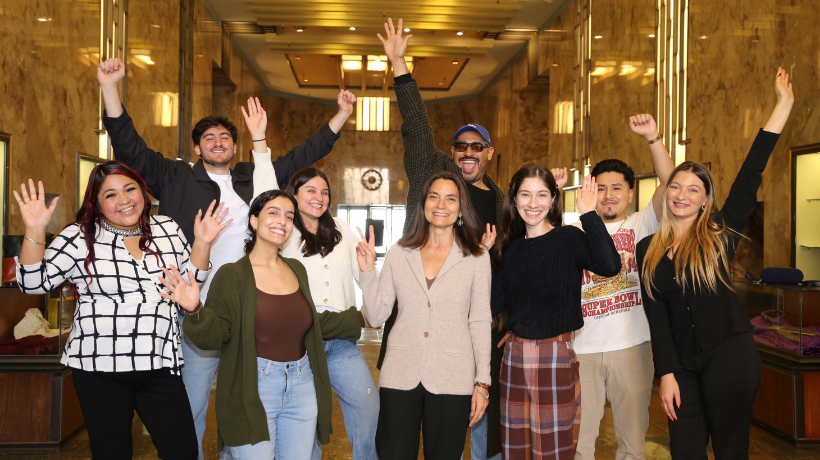Immigration Law Clinic

Southwestern's Immigration Law Clinic provides free legal representation to low-income children and adults in Special Immigrant Juvenile Status (SIJS) (clients under the age of 21), U nonimmigrant status (U Visa), and U-based Adjustment of Status cases. The Clinic is staffed by law students who represent clients under the supervision of Professor Andrea Ramos. Students learn many facets of professional responsibility such as client confidentiality, responsiveness to client demands, and accountability for their work. For many students, this is the first opportunity to take the lead on a case and directly serve the community.
Southwestern students may find the clinic application and other details on the Portal (log-in required).
"Working in a clinic is transformative. Students receive hands-on training and learn practical lawyering skills while working on real cases with real clients.”
~Professor Andrea Ramos - Director of the Immigration Law Clinic
- Immigration Law Clinic - FAQs
Q: What are some of the benefits of participating in the Clinic?
A: The Clinic provides students with hands-on training on client representation and casework. By working on real cases, students confront first-hand the many challenges involved in the practice of law. They fully immerse themselves in the practice of law and handle all aspects of a case.
Q: What do students do in the Clinic?
A: Students conduct in-depth interviews and learn effective techniques for interviewing and counseling children and survivors of violent crimes. Students also learn fact investigation skills as they work to develop and strengthen their cases to prepare them for filing with the U.S. Citizenship & Immigration Services (USCIS). Students lead case strategy discussions and often address difficult inadmissibility issues.
Q: What are the hour requirements for students working in the Clinic?
A: Students are expected to work about 15 hours per week at the Clinic. This includes classroom time and client work.
Q: What are the eligibility requirements?
A: Students must be in good academic standing and have completed their first year of study. The Immigration Clinic does not require prerequisite courses.
Q: How do students apply for the Clinic?
A: Interested students must submit an Immigration Law Clinic application available on the Portal The Clinic gives preference to third- and fourth-year students who have not had prior in-house clinic experience. Fluency in another language is not required. Selection is not based on academic rank.
- Immigration Law Clinic
The Immigration Law Clinic is a five-unit semester course and is graded. There are no course prerequisites and no final examination. Interested students must submit an Immigration Law Clinic application and resume via the Portal at MySWLAW. Enrollment in the Clinic is limited.
Law students, working under the supervision and guidance of Professor Ramos, represent children and adults in immigration matters. The Clinic will provide free legal representation to clients in Special Immigrant Juvenile Status (SIJS) (clients under the age of 21), Deferred Action for Childhood Arrivals (renewals only) (DACA), U nonimmigrant status (U visa) and U-based Adjustment of Status cases. This involves cases where clients have been abused, neglected or abandoned or have been victims of a serious crime.
The Clinic meets one day per week for a two-hour class. The classroom component focuses on the substantive law and procedure, and students receive training to prepare them to handle real cases. Students work approximately 15 hours per week.
The Clinic is a semester course; it is five units and graded. The grade is based on performance on casework, including client interviewing and counseling, advocacy work, research and writing, and office management.
- Special Immigrant Juvenile Status (SIJS)
SIJS is a way for certain undocumented children to obtain lawful permanent resident status (a green card). A child may be eligible for SIJS if she is under the jurisdiction of a juvenile court, placed in the custody of a state agency or department, or placed in the custody of an individual (e.g. a guardian), and whose reunification with one or both parents is not viable due to abuse, neglect, abandonment or a similar basis under state law. The juvenile court must determine that it is in the minor's best interest to remain in the United States and not be returned to her home country. There are additional requirements.*
- U Nonimmigrant Status (U visa) and U-based Adjustment of Status
The U visa is a form of immigration relief for non-citizens who suffer substantial physical or mental abuse resulting from having been a victim of certain criminal activity. To be eligible for a U visa, the victim must be helpful in the investigation or prosecution of the crime and obtain law enforcement certification. U nonimmigrants are eligible to apply for lawful permanent residency after three years in U nonimmigrant status. There are additional requirements.*
- DACA Renewals & Information
Please speak with an attorney to understand how the most recent court ruling might impact you.
For more comprehensive information click on DACA Information which links to the Immigrant Legal Resource Center (a non-profit organization).
*NOTE: This page is for informational purposes only. Please be sure to consult with an attorney for an assessment of legal options.